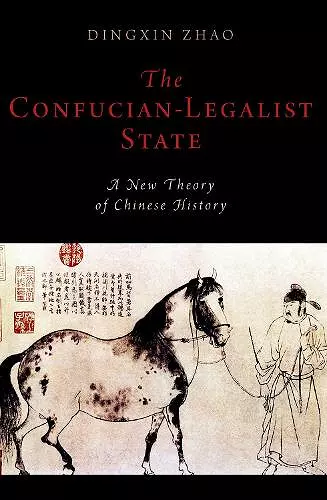The Confucian-Legalist State: A New Theory of Chinese History
Format:Paperback
Publisher:Oxford University Press Inc
Published:7th Jun '18
Currently unavailable, and unfortunately no date known when it will be back

In The Confucian-Legalist State, Dingxin Zhao offers a radically new analysis of Chinese imperial history from the eleventh century BCE to the fall of the Qing dynasty. This study first uncovers the factors that explain how, and why, China developed into a bureaucratic empire under the Qin dynasty in 221 BCE. It then examines the political system that crystallized during the Western Han dynasty, a system that drew on China's philosophical traditions of Confucianism and Legalism. Despite great changes in China's demography, religion, technology, and socioeconomic structures, this Confucian-Legalist political system survived for over two millennia. Yet, it was precisely because of the system's resilience that China, for better or worse, did not develop industrial capitalism as Western Europe did, notwithstanding China's economic prosperity and technological sophistication beginning with the Northern Song dynasty. In examining the nature of this political system, Zhao offers a new way of viewing Chinese history, one that emphasizes the importance of structural forces and social mechanisms in shaping historical dynamics. As a work of historical sociology, The Confucian-Legalist State aims to show how the patterns of Chinese history were not shaped by any single force, but instead by meaningful activities of social actors which were greatly constrained by, and at the same time reproduced and modified, the constellations of political, economic, military, and ideological forces. This book thus offers a startling new understanding of long-term patterns of Chinese history, one that should trigger debates for years to come among historians, political scientists, and sociologists.
A surprisingly rich new macro-historical approach to Chinese civilization.... This wide-ranging work of thoughtful analysis is as refreshing as it is sound, and will repay the reading of anyone interested in understanding China. * Russell Kirkland, University of Georgia *
[N]o earlier historians of the modernization school have attempted to make their case with such a thorough discussion of all of history (with the exception of Mark Elvin, who saw a revolution on all fronts in the middle period and stagnation thereafter); have done so in a manner that casts new light on the interpretation of early history; or have taken early modern Europe as a comparative frame for all of China's history. It is a strong defense of the liberal position in China today against those scholars and politicians who claim that China's future can be positively related to its past. * Peter K. Bol, American Historical Review *
[H]istorical sociologists, comparative historians, and historians of China should all welcome The Confucian-Legalist State. It represents a major effort to think at a macrolevel about China's historical development. * American Journal of Sociology *
Empirically rich and conceptually clear, Zhao's work combines vast historical evidence, cutting-edge social theories, and rigorous analytical strategy to present a compelling case of why China's pattern of state formation diverged from Europe's more than two millennia ago, creating a Confucianist-Legalist centralized bureaucratic state that lasted into modern times. It is historical social sciences at its best. This book is going to change our view on Chinese history forever. * Ho-fung Hung, Johns Hopkins University *
This is a brilliant, major book. It is ambitious in every sense. Zhao attempts to rewrite both macro-sociological theory and Chinese historical development, and he gives a new answer to the old question of why Europe ultimately developed and China did not. He largely achieves these ambitious goals through an extraordinary combination of erudition and analytical power. * Michael Mann, University of California, Los Angeles *
This book offers an intriguing and not uncontroversial explication for a two-part problem of compelling interest today: (1) why was China able to achieve a unified, bureaucratic empire by the Qin dynasty? and (2) why did the imperial institutions and ideology forged in the Qin-Han period show such great resilience over two millennia? Zhao, in moving away from the simplistic narratives offered in all too many textbooks, provides us a fresh look at complicated historical processes that deserve our reconsideration. * Michael Nylan, University of California, Berkeley *
ISBN: 9780190886950
Dimensions: 155mm x 231mm x 28mm
Weight: 658g
472 pages